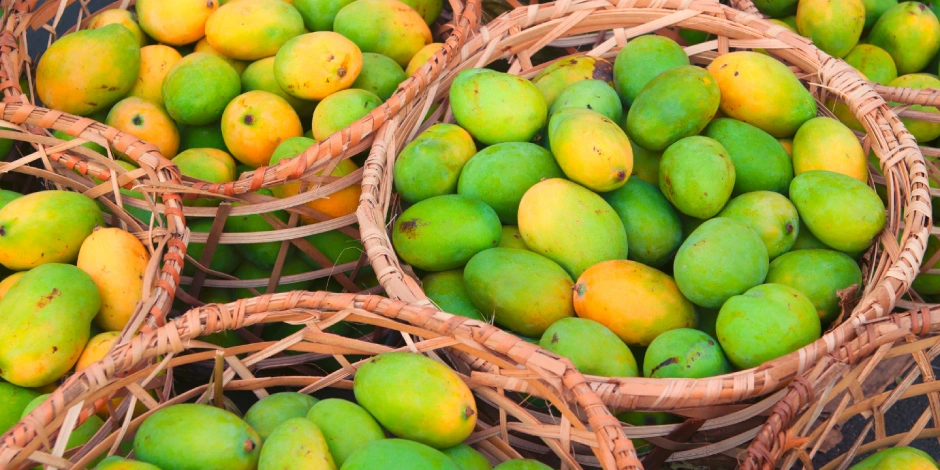Imagine biting into a juicy, ripe mango on a hot summer day. The sweetness is refreshing, but there’s much more to this tropical delight than just its delicious flavor. Mangoes are nutritional powerhouses packed with vitamins, minerals, and antioxidants that offer numerous health benefits. In this blog post, “Mango’s Nutritional Value and Applications,” we’ll explore why mangoes should be a staple in your diet and how you can use them in a variety of exciting ways.
Did you know that a single cup of mango provides 100% of your daily vitamin C needs? This vibrant fruit also boasts significant amounts of vitamin A, vitamin E, and dietary fiber, all of which contribute to a healthier you. Beyond their impressive nutritional profile, mangoes have a rich history of being used in diverse culinary and medicinal applications. From smoothies and salads to skincare routines and traditional remedies, the possibilities are endless.
Join us as we delve into the myriad benefits of mangoes and discover creative ways to incorporate them into your daily life. Whether you’re looking to boost your immune system, improve digestion, or simply enjoy a tasty treat, mangoes are the perfect choice. Let’s embark on this flavorful journey and unlock the secrets of this incredible fruit!
Mango’s nutritional value
The mango fruit has a lot of nutrients. Mango is one of the best native fruits at the level of food quality. Mangoes are nutrient-dense fruits that contain a variety of vitamins, minerals, and beneficial compounds. A one-cup serving of mango, sliced into pieces, contains around 99 calories, 1.3 grams of protein, 25 grams of carbohydrates, 2.6 grams of fiber, and 22 grams of sugar, with minimal fat and no cholesterol.
Vitamins and Minerals
Mangoes are particularly rich in vitamin C, supplying about 67% to 76% of the recommended daily value in just one cup. This vitamin is essential for collagen production, immune function, and skin health. Moreover, one cup of mango contains 10% of the daily value for both vitamins A and E, both of which play important roles in vision, immunity, and skin health. Mangoes also contain several valuable minerals, including potassium, which helps regulate blood pressure by preventing sodium intake. Calcium, iron, copper, magnesium, folate, and lycopene are among the other nutrients present in mangos.
Fiber Content
Mangoes are an outstanding source of nutritional fiber, providing approximately 12% of the recommended value per meal. The fiber content assists digestion, helps maintain regular bowel movements, and creates a feeling of fullness, all of which can help with weight management. Mangoes’ liquid fiber has also been related to reduce total and LDL cholesterol levels, which promotes heart health.
Antioxidants and Phytochemicals
The Mango fruit is heavy in antioxidants including beta-carotene and vitamin C, which help to protect against free radical damage, which has been linked to chronic diseases and aging. Mango phytochemicals such as mangiferin, carotenoids, and phenolic acids have been related to anti-inflammatory, anti-diabetic, anti-obesity, and even anti-cancer activity.
Applications of mango
Mango tree is used for many purposes. Old and dead trees can be used for furniture, doors, windows, tables, chairs etc. and even for fuel. Mango is very important in medicine industry. Mango leaves, flowers, fruits and seeds are used to prepare unani herbal, allopathic, kabiraji medicine. Various products made from mango like juice, ice cream, faluda, pickles etc. are being sold in various hotels and restaurants. Also chutney, chocolate, candy, lollipop, juice, squash, mangobar, pickles are being manufactured by various companies like Pran Agro Processing Limited, Abdul Monem Limited, Kiswan Agro Products Limited, Akiz Food and Beverage Limited etc. They are selling all these products in the country and also earning a lot of foreign exchange by exporting abroad.
Importance Mango pulp
Mango pulp is an important unused waste, part of which is used for pen making in nurseries. However, it is a valuable recyclable organic product with great potential for producing edible oil from the shell. In this country, mangoes are not used for anything other than nurseries, but in the neighboring country of India, cosmetic oils, body sprays and shampoos are produced from mangoes and mangoes.
In conclusion, mangoes are much more than a delicious fruit—they are packed with essential nutrients that provide numerous health benefits. From boosting your immune system with vitamin C to improving digestion with dietary fiber, mangoes are a valuable addition to any diet. Their versatility extends beyond the kitchen, finding applications in skincare and traditional medicine.
By incorporating mangoes into your daily routine, you can enjoy their sweet taste while reaping their nutritional rewards. Whether you eat them fresh, blend them into smoothies, or use them in salads and desserts, mangoes are a delightful and healthy choice. Embrace the goodness of mangoes and discover all the ways they can enhance your health and well-being.








